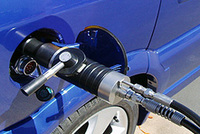Toyota Targets $50,000 Price for First Hydrogen Car
Tokyo May 6, 2010; Alan Ohnsman writing for Bloomberg reported that Toyota Motor Corp., the biggest seller of hybrid cars, said it has cut the cost of making fuel-cell vehicles by about 90 percent since the mid-2000s and may be able to price its first retail hydrogen model at about $50,000.
The first model will be a sedan with driving range equal to a gasoline-powered car, “with some extra cost,” Yoshihiko Masuda, Toyota’s managing director for advanced autos, said in an interview. The Japanese carmaker has cut production costs to about one-tenth of earlier estimates that ran as high as $1 million a car and would need to reduce current expenses by about half before starting retail sales, he said.
“Our target is, we don’t lose money with introduction of the vehicle,” Masuda said in Torrance, California, where Toyota’s U.S. sales unit is based. “Production cost should be covered within the price of the vehicle.”
Hydrogen cars that don’t sell at a loss may boost support for the technology, which has lagged behind electric cars in U.S. research funding amid criticism it’s too expensive. Toyota, General Motors Co., Honda Motor Co., Daimler AG and Hyundai Motor Co. have all said they will be ready to sell fuel-cell vehicles to retail customers by about 2015.
Toyota plans to sell an “affordable” model in the U.S. and elsewhere, the Toyota City, Japan-based company has said, without providing details. Were the carmaker to set a U.S. price at about $50,000, the market for the vehicles would be “small, but with some support,” Masuda said, without elaborating.
Potential Advantage
“On a cost basis per car, range and performance, fuel-cell vehicles can have an advantage over battery vehicles,” said Jay Whitacre, a professor of materials science and engineering at Carnegie Mellon University in Pittsburgh. “On a system basis, infrastructure, battery cars win.”
Toyota’s American depositary receipts fell 64 cents to $75.13 at 4:07 p.m. in New York Stock Exchange composite trading. They have declined 11 percent this year.
Masuda declined to discuss Toyota’s sales volume goal for the car.
California, Japan, Germany and South Korea are promoting fuel-cell vehicles to help curb greenhouse gasses, as the only exhaust from the cars is water vapor. Fuel cells, layers of plastic film coated with platinum sandwiched between metal plates, make electricity in a chemical process combining hydrogen and oxygen.
Less Platinum
Toyota cut expenses to make the vehicles by reducing platinum use to about one-third the previous level and finding cheaper ways to produce the thin film used in the fuel cells and the carbon-fiber hydrogen fuel tanks, Masuda said yesterday at a conference in Long Beach, California, held by the National Hydrogen Association, a trade group that lobbies for the fuel.
Toyota and GM now use about 30 grams (1.06 ounces) of platinum per fuel-cell vehicle and aim to reduce it to about 10 grams, according to Masuda and Charles Freese, GM’s executive director of global powertrain engineering. Platinum futures for July delivery rose $25.90, or 1.6 percent, to $1,675.60 an ounce on the New York Mercantile Exchange.
Shifting from low-volume assembly to mass-scale production would lead to further cost reductions, he said.
Hydrogen vehicles are typically larger and offer greater range and faster fueling than battery models. A lack of fuel stations, high production costs and limited durability have slowed their introduction beyond test fleets.



